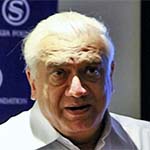
Syria has too many military fronts and too many contending players. These, taken together, have created an uneasy calm before the major storm that is to come.
At Idlib, Russian and Turkish forces have been patrolling the six-kilometer-wide security corridor along the M4 highway, but the highway remains closed to traffic. There are reports that the Syrian government and its Russian advisers are planning a major assault to decimate the entrenched Hayat Tahrir Al-Sham (HTS) and recover this last bastion of rebel-held territory. Turkey seems to be ambivalent and is perhaps negotiating with Russia the possible accommodation of its interests in Libya in exchange for its acceptance of some initial moves against HTS at Idlib.
At the same time, there are indications that HTS leader Abu Mohammed Al-Julani is attempting to project a new image of himself, showcasing political leadership in a public milieu in place of his earlier persona as the reclusive head of an extremist organization. He has made numerous media appearances that show him as a leader concerned about the well-being of ordinary people in the Idlib governorate. Turkey is supportive of this new look, probably wishing to persuade the Russians to accept that HTS is no longer an extremist group but a mainstream political entity.
Even as northwestern Syria is girding itself for the long-anticipated attack on Idlib, the northeast remains the theater where Turkish and Kurdish interests directly collide. An uneasy peace is maintained by Russian military police, who patrol the Syria-Turkey border from the Euphrates to the Iraq border and control two-thirds of the Kurdish-dominated region. The Kurds are represented by the US-backed Syrian Democratic Forces (SDF), while US troops are also present in the region, ostensibly to protect the oil fields.
In this hotbed of contention, a new source of disquiet has been introduced, with the SDF entering into a 25-year agreement with an obscure American energy company, Delta Crescent Energy, to market the oil produced in the area and, in the near future, set up two refining facilities. Promoted by SDF leader Mazlum Kobane, the agreement is an effort by the Kurds to keep the US engaged on their side and — as oil revenues make the Kurds economically self-sufficient — support Kurdish autonomy in Syria on the lines of what the US achieved for the Kurds in Iraq through the Kurdistan Regional Government (KRG).
In this fraught situation, there were two skirmishes in Syria involving US forces last month.
Talmiz Ahmad
The agreement has been condemned by the Syrian government. It could also be wrecked on the rocks of opposition from both Turkey and Russia. The former sees the SDF as a “terrorist” organization that is closely affiliated with its own Kurdish dissidents in the Kurdistan Workers’ Party (PKK). Turkish President Recep Tayyip Erdogan has described the US approach as a “disgrace to democracy.” Russia supports a united and sovereign Syria, with the Kurds participating in a federal arrangement. Moscow is also unenthusiastic about a continued US military presence in Syria, particularly when 90 percent of the country’s oil is in territories now under American control.
In this fraught situation, there were two skirmishes in Syria involving US forces last month. The first occurred at Qamishli, on the Turkish border, on Aug. 17, when Syrian government troops faced US soldiers at a checkpoint. In this encounter, a Syrian soldier was killed and two were wounded. Government sources said US helicopters had attacked the checkpoint.
The second incident occurred on Aug. 25, when a Russian military vehicle hit an American vehicle, causing some US troops to suffer concussion. The US called this “unsafe and unprofessional behavior” by the Russians, while the latter said their patrol was being deliberately blocked by the US vehicle. These skirmishes are causing concerns that they could inadvertently escalate into larger conflicts.
Meanwhile, the threat from Daesh continues. US officials believe that several thousand fighters remain in “sleeper cells” in the eastern desert areas of Syria. The killing of a Russian major general near Deir Ezzor on Aug. 18 and the blowing up of a gas pipeline near Damascus on Aug. 24 have been attributed to Daesh militants by US officials.
Alongside these sporadic skirmishes and preparations for larger conflicts, there has also been some recent Syria-related diplomatic activity. In order to maintain its ties with the Kurds, Russia hosted a conclave of the political wing of the SDF, the Syrian Democratic Council (SDC), and the Popular Will Party that it supports. The conference affirmed that, while the SDC is crucially dependent on US support, it is also anxious to retain relations with Russia as the other influential player in the country, particularly as it is capable of restraining Turkey.
Another meeting saw an attempt to restart the UN-sponsored political process for Syria by bringing together government and opposition figures in Geneva to rewrite the country’s constitution. At the conference, an opposition leader called for a nationwide cease-fire as a necessary precursor to reviving the political process in the country. As the principal role-players in the Syrian theater seemingly plan to take their competitions to outright conflict in the coming weeks, this call was responded to with silence.
Talmiz Ahmad is an author and former Indian ambassador to Saudi Arabia, Oman and the UAE. He holds the Ram Sathe Chair for International Studies at the Symbiosis International University in Pune.

